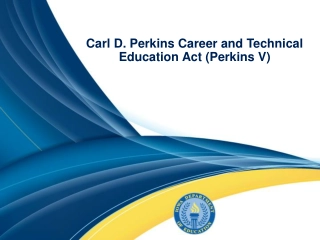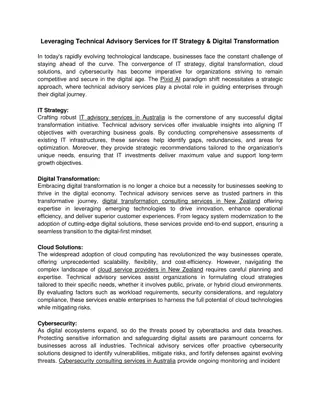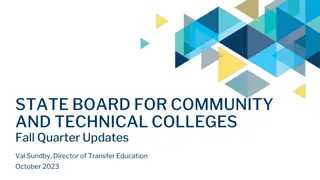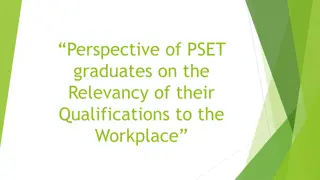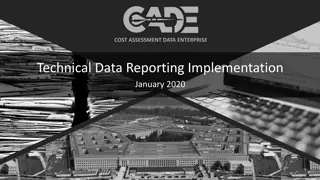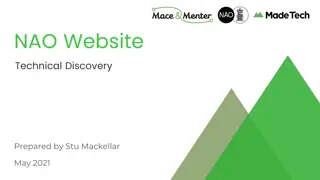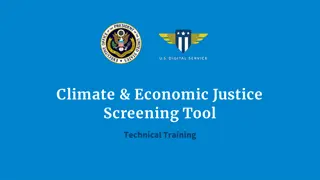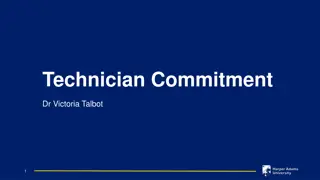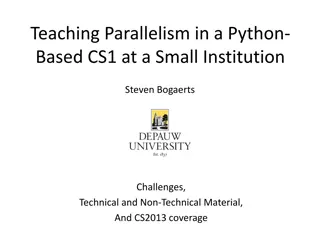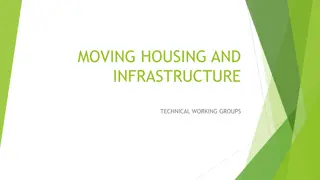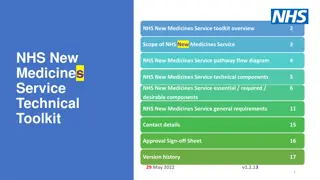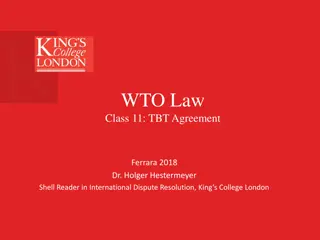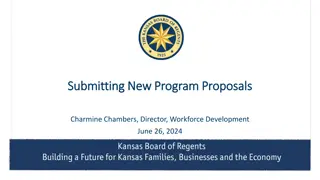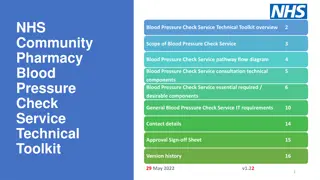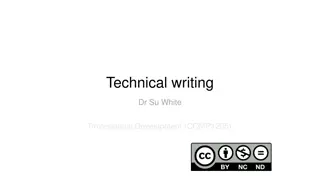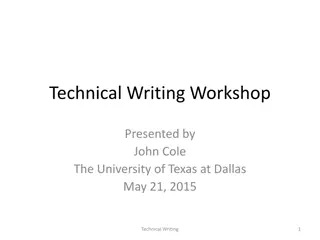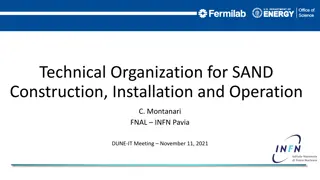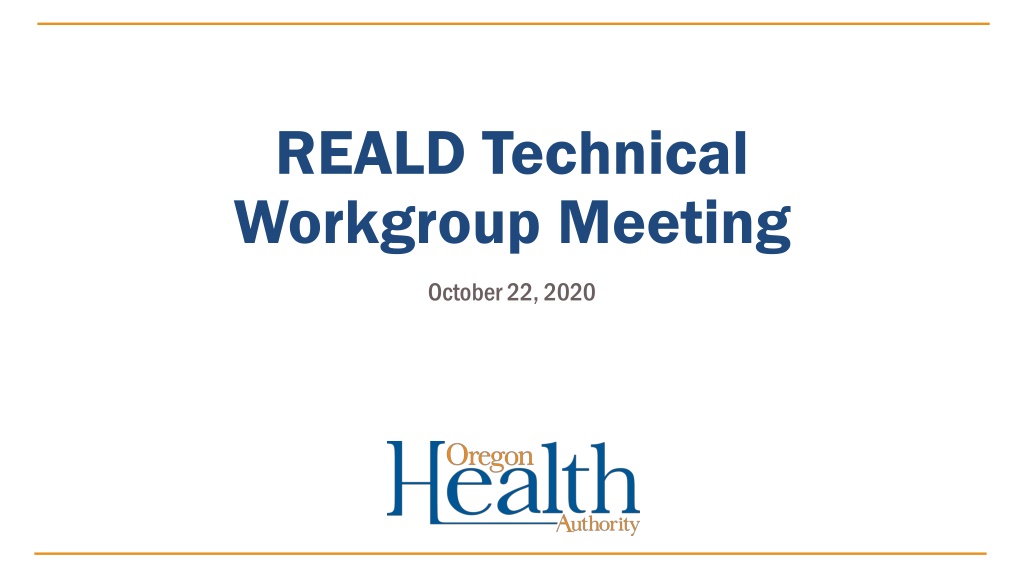
REALD Technical Workgroup Meeting Overview
"Explore the REALD Technical Workgroup Meeting insights including implementation status, EHR coordination, legacy work progress, workflow discussions, and future plans for enhanced interoperability."
Uploaded on | 0 Views
Download Presentation

Please find below an Image/Link to download the presentation.
The content on the website is provided AS IS for your information and personal use only. It may not be sold, licensed, or shared on other websites without obtaining consent from the author. If you encounter any issues during the download, it is possible that the publisher has removed the file from their server.
You are allowed to download the files provided on this website for personal or commercial use, subject to the condition that they are used lawfully. All files are the property of their respective owners.
The content on the website is provided AS IS for your information and personal use only. It may not be sold, licensed, or shared on other websites without obtaining consent from the author.
E N D
Presentation Transcript
REALD Technical Workgroup Meeting October 22, 2020
Agenda Welcome Overview of situation, work ahead CSV so far, tracker of Phase 1 orgs EHR coordinated implementation work Legacy and Epic TC/BFF coordination Standard data model and discuss workflow options Updates on OHA requirements, new REALD standards Race/Ethnicity Tiger Team Work Future: ELR, eCRoptions Wrap Up and Next Steps
Overview of Situation and Work Ahead
REALD Implementation Status Phase 1 Organization Phase 1 Organization Legacy OHSU Neighborhood Health Asante ... Submission Type Submission Type CSV CSV CSV CSV Status Status Onboarding Onboarding CSV preparation CSV preparation If you have SFTP, quick process If not, you will need to set up and test your connections and ensure files are received will take longer Regular review: Regular review: # sites submitting by each submission type with complete REALD data
EHR Coordinated Implementation Work Legacy and Epic TC/BFF Coordination Discuss Workflow Options Standard Data Model
Legacy and Epic Work So Far Epic coordination through AJ Ankenbauer AJ has been in contact with all Oregon Epic TCs and BFFs. Legacy pilot opportunity. Show and Tell - What's been developedusing tools in Epic? Race/Ethnicity/Language What can be done within the current framework? Tricky areas Disability flowsheet Best Practice Advisory (BPA) notifications Thinking ahead to interoperability How are data shared across organizations?
Workflow Options Discussion How are your workflows similar/different to Legacy's? What are the workflows your organization is thinking about? e-check-in/pre-registration Registration via interview MyChart Clinical staff nurse or MA Would it be helpful for Legacy and others to pilot?
Standard Data Model Are we on the right track?
Updates on OHA requirements, new REALD standards
REALD Standards Status There are updated 2020 standards for REALD beginning November 1, 2020 Draft changes have been included in the English versions of the REALD template, subject to change with Tribal consultation 10/14 Phase 1 providers may collect REALD data for COVID-19 encounters using the 2014 standards for the month of October Providers must use the updated 2020 standards beginning November 1, 2020 At this time, collection and reporting is only required on COVID-19 encounters Legislation may be passed in the future to expand REALD requirements beyond COVID Resources: REALD templates: https://sharedsystems.dhsoha.state.or.us/DHSForms/Served/me0074.pdf
How often are data collected and reported? Annual REALD data collection is required If a provider has collected REALD data from a patient within the last year and the patient has a subsequent encounter, providers may use the REALD data previously collected to report to OHA Otherwise, providers must collect REALD data from a patient at the time of an encounter or as soon as possible thereafter Providers are not required to collect and report REALD data if data were reported to OHA within the last year (prior 365 days)
Whats a COVID-19 Encounter? An encounter is an interaction: between a patient, or the patient s legal representative, and a health care provider, whether in-person or through telemedicine, for the purpose of providing health care services related to COVID-19. Health care services related to COVID-19 include, but are not limited to, ordering or performing a COVID-19 test Labs are unlikely to have COVID-19 encounters REALD information does not need to be submitted to OHA after every COVID-19 encounter, just if there is a disease reporting obligation.
When is REALD reported? REALD data is required when reporting COVID-19 encounters that are reportable under Oregon Disease Reporting rules. These include: COVID-19 tests (positive and negative)* COVID-19 cases^ COVID-19 hospitalizations^ COVID-19 deaths^ MIS-C (Multisystem Inflammatory Syndrome in Children)^ * Within one local public health authority working day ^ Within 24 hours (including weekends and holidays)
CSV Reporting Option COVID-19 Reporting Portal at healthoregon.org/howtoreport CSV File Submission with OHA approval 2 options: 1.Full file: CSV file that includes REALD + case reporting, including lab reportable data 2.REALD only file for those submitting ELR or case reporting otherwise: CSV file that includes REALD + patient and provider identifying data Daily submission is preferred, although weekly is acceptable CSV File Specifications are available at the Electronic Case Reporting page. To establish CSV reporting: ELR.project@dhsoha.state.or.us
Are extensions to the Phase 1 reporting deadline available? OHA has made a form available to submit a request for extension. OHA will not grant an extension on the basis that a health care provider lacks the current capability of capturing REALD data in their electronic health records. A detailed explanation of why the health care provider cannot meet the deadlines must be provided in the extension request. Enforcement begins 12/31/2020 Resources: Extension requests process/forms https://www.oregon.gov/oha/OEI/REALD%20Documents/HB-4212-Extension- Requests.pdf
Tiger Team Activity First meeting held on 10-22 Participants from OCHIN, OHSU, Asante, OPCA, NW Human Services,HIT Commons, and Neighborhood Health Center Issue to address: Federal reporting alignment with REALD Two additional meetings are scheduled
Highlights from Meeting Organizations are currently collecting race and ethnicity as separate asks Census and REALD data comparison/alignment issues Asking same question twice Data crosswalks from REALD to UDS may bepartof the solution to meet theirreportingneeds to HRSA When REALD, race may not be reported for Latinx individuals (only getting ethnicity) and ethnicity (Latinx/notLatinx) may not be reported - coding for "not answered" vs "notreported" OCHIN will be updating their system to collect the 900+ options in the CDC Standard (which complies with the eCR standard) however, the CDC standard does not include the REALD categories of Slavic and Somali
Next Steps Analyze data crosswalks to understand what tools are needed to align reporting Clarify where reporting guidance is needed to support staff who are collecting and analyzing the data Research options to add race categories to the national CDC standard
Next steps OHA Workgroup Finalizing REALD for Nov 1 Updated portal New FAQs ELR,eCR, CDC standards CSV onboarding Additional communication and outreach Tiger Team Meetings Pilots and meetings for pilots Contact: Susan Otter, Director of HIT, susan.otter@dhsoha.state.or.us Karen Hale, karen.hale@dhsoha.state.or.us
CEHRT Standards Race and Ethnicity Race and Ethnicity Over 900 900 Race/Ethnicity Options Must be able to record multiple races or ethnicities multiple races or ethnicities Must be able to be correctly roll up to the Office of Management and Budget value (i.e., American Indian or Alaska Native; Asian; Black or African American; Native Alaska Native; Asian; Black or African American; Native Hawaiian or Other Pacific Islander; White; and Hispanic or Hawaiian or Other Pacific Islander; White; and Hispanic or Latino Latino) Must be able to record decline to answer decline to answer A health IT developer is free to determine how the user interface is designed, including how many race and ethnicity values are displayed 170.207(f)(2) CDC Race and Ethnicity Code Set Version 1.0 (March 2000) 170.207(f)(1) The Office of Management and Budget Standards for Maintaining, Collecting, and Presenting Federal Data on Race and Ethnicity, Statistical Policy Directive No. 15, as revised, October 30, 1997 Languages Languages Over 500 language options in the standard A product does not need to display all of the language codes to meet the certification criterion. The developer has the discretion to create a default selection set or enable customization choices for providers. American Indian or 170.207(g)(2) Request for Comments (RFC) 5646, Tags for Identifying Languages, September 2009 http://www.loc.gov/standards/iso639-2/php/code_list.php
REALD Resources HB4212/REALD Provider Page: https://www.oregon.gov/oha/OEI/Pages/REALD-Providers.aspx COVID-19 Reporting Portal at healthoregon.org/howtoreport List of REALD data crosswalk to CEHRT standards: REALD/CDC Crosswalk CSV specifications are available at the Electronic Case Reporting page. To establish CSV reporting, reach out to ELR.project@dhsoha.state.or.us REALD learning sessions, including 10/14 webinar on reporting

